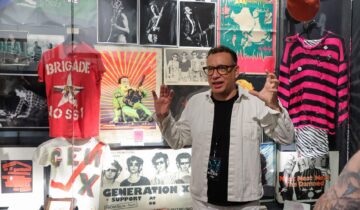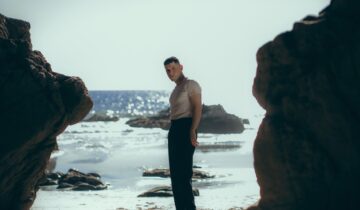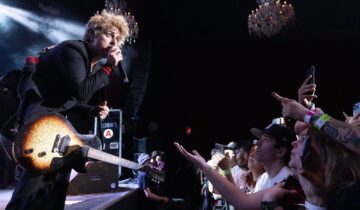 For the ECONOMIST: THREE years ago, Pat Cassidy took a call from James Sider, the founder of BandPage, a San Francisco-based app that makes musicians’ content and merchandise available across platforms like Spotify and Google. Mr Cassidy, a band manager based in Austin, Texas, was used to hearing marketing pitches from various music start-ups, and was not thrilled by the thought of another.
For the ECONOMIST: THREE years ago, Pat Cassidy took a call from James Sider, the founder of BandPage, a San Francisco-based app that makes musicians’ content and merchandise available across platforms like Spotify and Google. Mr Cassidy, a band manager based in Austin, Texas, was used to hearing marketing pitches from various music start-ups, and was not thrilled by the thought of another.
But Mr Sider caught his attention with some simple observations. Average fans spend money on a band maybe two or three times a year, Mr Sider explained. They buy an album, a concert ticket, maybe a shirt. But what does that amount to? Maybe $60. For most bands that’s not sustainable. “What about relying on super fans to fund you more regularly?” Mr Sider suggested.
“He said, ‘How about a date on Skype to meet your fans’, or ‘why not offer a date to the Austin music awards with your band,’ and I knew he was on to something,” says Mr Cassidy. “$5,000 for one night for us is good, but to support a tour manager, the driver, the band, and the crew, it’s not enough. If the top 100 fans in that venue come early and pay an extra $10 to see an acoustic set and a meet-and-greet with the band, that’s an extra $1,000. That’s the difference between my guys having health insurance and not.”
Doom and gloom have been the music industry’s dominant narrative since the late 1990s, when Napster and other file-sharing services threw a wrench into the system. The debate continues: at the end of last year, well-known artists like Taylor Swift and Thom Yorke of Radiohead lambasted Spotify, a music-streaming service, for its royalty payments.
But Messrs Cassidy and Sider and many of their industry peers, who mostly focus on mid-market bands, have moved on. They say time is better spent using available technology to pursue super fans who have disposable income, are keen to spend it not just on products but on immersive experiences—like living-room performances—and have vast social networks that bands can tap into. The two men agree that interaction with fans and promotion of the artists, previously tasks for managers or record companies, are now largely up to musicians themselves.
“Instead of worrying about Spotify’s royalty rates for streams, artists should be worrying about what content or merchandise they can provide to a fan base that wants to consume everything they do,” says Dave Cool, the director of artist relations at BandZoogle, a Montreal-based start-up that makes band websites. “There’s so much money being left on the table. Fans want to be able to do more, have more experiences, buy custom product and merchandise, but so much of that is not being done.”
Fan engagement is not a new buzzword among industry professionals, but there’s more action and less talking now, according to Mr Cool. A seemingly endless arsenal of low-cost digital tools makes it increasingly efficient for artists to find their fans, learn what they like, work out how to meet those expectations, and involve them in the creative process.
Patreon, a crowdfunding platform, allows patrons to pledge money every time a band or artist produces something: a new video, an animated cartoon, an e-zine. The patrons then get exclusive access to those items, additional bonus items, or, for the top donors, private listening sessions with the band. Brian Buchanon of Jubilee Riots, a folk-rock group from Toronto, has used platforms like Google Helpout and StageIt to offer paid-for music lessons to fans online. The band has organised six European tours that it sold to as many as 200 fans as a holiday with their musical heroes. Megadeth, an American metal band, recently worked with PledgeMusic, a London-based crowdfunding site, to record their 15th album: fans who pledge can pre-order the album, get signed guitars, have a guitar lesson with the band, spend a day with them in the studio, and participate in a jam session.
To stay relevant, modern musicians need to build a social fabric: they want as many people as possible talking about the same thing. But they have to nourish their fans in an authentic way, says Kiran Ghandi, a former digital analyst for Interscope Records and a touring drummer for M.I.A, a rapper.
Social media grants a sense of entitlement that can raise questions about the relationships between bands and fans, according to Ms Ghandi. “Super fans evangelise,” she says. “But there’s that sense of growing narcissism, that all of these online tools enable fans to know they’re valuable to bands, that if they post about you, they think you’re the lucky one. If you don’t tweet back, you may appear negative in their eyes. And they can stop being your fan at any second because you didn’t give them that reaction and affirmation they’re used to.”
Image: fans at a 2013 Gogol Bordello performance in Champaign-Urbana, IL. Photo by Sarah Skiold-Hanlin



